Ecosystems, food chains and food webs -> mollusks
Mollusks
Mollusks are a diverse group of invertebrate animals that belong to the phylum Mollusca. This phylum is one of the largest groups of animals on the planet, with over 100,000 species identified to date. Mollusks can be found in a wide range of habitats, including marine and freshwater environments, as well as on land.
Characteristics of Mollusks
Mollusks share several key characteristics that distinguish them from other animals:
- Soft body: Mollusks typically have a soft body that is often protected by a hard shell.
- Shell: Many mollusks, such as snails, clams, and oysters, possess a shell that provides protection and support.
- Foot: Most mollusks have a muscular foot that they use for locomotion.
- Mantle: The mantle is a layer of tissue that covers the internal organs and often secretes the shell in shelled mollusks.
- Radula: Many mollusks have a specialized feeding structure called a radula, which is used to scrape food particles from surfaces.
Major Classes of Mollusks
Mollusks are classified into several major classes, each with its own unique characteristics:
- Gastropoda: This class includes snails and slugs, which are characterized by their single, coiled shell or absence of a shell.
- Bivalvia: Bivalves, such as clams, mussels, and oysters, have two hinged shells that enclose the soft body.
- Cephalopoda: This class includes squids, octopuses, and nautiluses, which have well-developed heads and tentacles, and often lack an external shell.
- Polyplacophora: Chitons are the main members of this class and are characterized by their shell, which consists of eight overlapping plates.
- Scaphopoda: Members of this class, known as tusk shells, have tubular, tusk-shaped shells and are found in marine environments.
- Aplacophora: Aplacophorans are worm-like mollusks that lack shells and are found in deep-sea habitats.
Ecological and Economic Importance
Mollusks play crucial roles in various ecosystems and have significant economic importance. They serve as food sources for many organisms, including humans, and are also important filter feeders that help maintain water quality in aquatic environments. Additionally, mollusks such as snails and slugs can be both beneficial and harmful in agricultural settings.
Understanding the biology and ecology of mollusks is essential for conservation efforts and the sustainable management of mollusk populations, especially those that are targeted for human consumption.
Study Guide
Here are some key points to include in your study of mollusks:
- Identify and describe the major classes of mollusks, including their distinguishing characteristics and examples of species in each class.
- Explain the ecological roles of mollusks in different habitats and ecosystems.
- Discuss the economic importance of mollusks, including their role as food sources and potential impacts on agriculture.
- Explore the adaptations of mollusks for feeding, locomotion, and defense.
- Investigate the conservation status of mollusk species and the efforts aimed at their protection.
By mastering these concepts, you will gain a comprehensive understanding of the biology, ecology, and significance of mollusks in the natural world.
[Mollusks] Related Worksheets and Study Guides:
.◂Science Worksheets and Study Guides Seventh Grade. Ecosystems, food chains and food webs

 Activity Lesson
Activity Lesson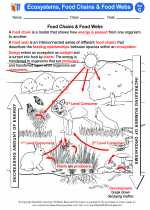
 Worksheet/Answer key
Worksheet/Answer key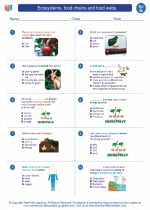
 Worksheet/Answer key
Worksheet/Answer key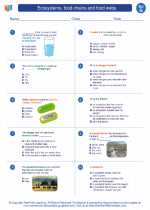
 Worksheet/Answer key
Worksheet/Answer key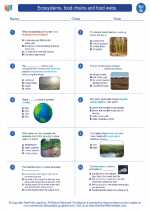
 Vocabulary/Answer key
Vocabulary/Answer key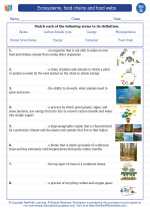
 Vocabulary/Answer key
Vocabulary/Answer key
 Vocabulary/Answer key
Vocabulary/Answer key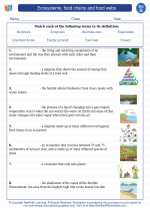
 Vocabulary/Answer key
Vocabulary/Answer key
 Vocabulary/Answer key
Vocabulary/Answer key
